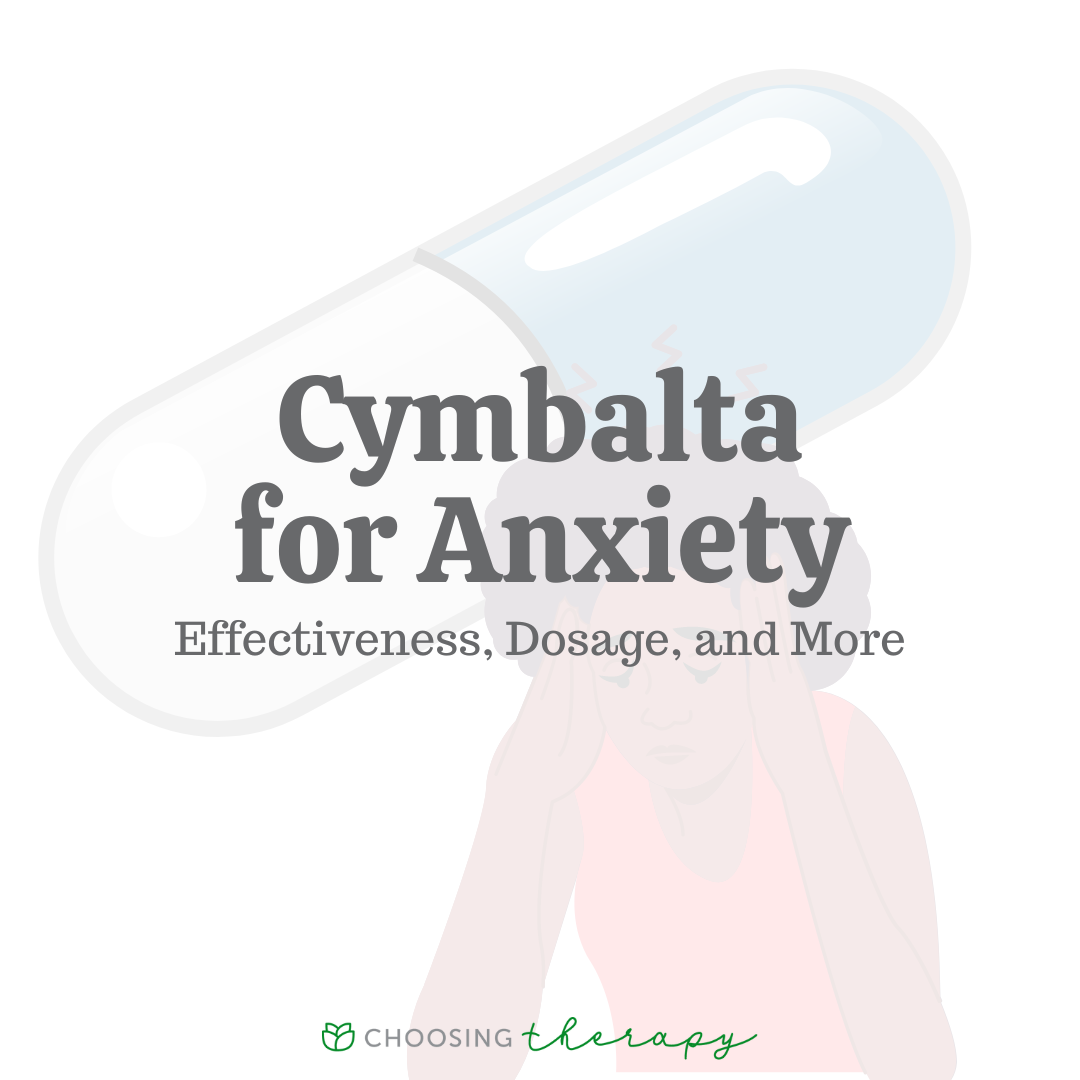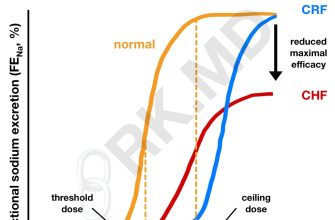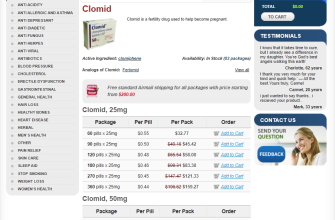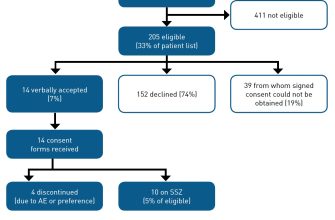Cymbalta (duloxetine) offers significant relief for many individuals struggling with anxiety disorders. Research supports its effectiveness in alleviating symptoms, thanks to its ability to balance serotonin and norepinephrine levels in the brain. This dual mechanism helps to improve mood and reduce anxiety, making it a popular choice among healthcare providers.
Clinical studies indicate that patients using Cymbalta often experience a noticeable decrease in anxiety symptoms within a few weeks of starting treatment. This rapid response time is particularly beneficial for those looking for swift solutions to their distress. Users frequently report reduced tension, improved focus, and a greater overall sense of well-being.
It’s important for anyone considering Cymbalta to consult with their healthcare provider. Individual responses to medications can vary, and a professional can help determine if Cymbalta aligns with specific health needs. Being informed about potential side effects, such as nausea or fatigue, also plays a critical role in the decision-making process.
Those currently using or contemplating Cymbalta for anxiety should monitor their symptoms and maintain open communication with their physician. Adjustments to dosage or switching medications might be necessary to achieve optimal management of anxiety. With the right approach, many discover that Cymbalta significantly enhances their quality of life.
- Is Cymbalta Good for Anxiety?
- How Cymbalta Works
- Benefits and Considerations
- Understanding Cymbalta and Its Uses
- Indications for Use
- Dosing and Considerations
- How Cymbalta Affects Anxiety Symptoms
- Comparative Effectiveness of Cymbalta for Anxiety
- Clinical Trial Insights
- Side Effects and Considerations
- Side Effects and Risks of Taking Cymbalta for Anxiety
- Patient Experiences: Real Stories About Cymbalta and Anxiety
- Consulting with Your Doctor: Recommendations for Cymbalta Use
- Dosage and Administration
- Monitoring and Side Effects
- Alternatives to Cymbalta for Managing Anxiety
Is Cymbalta Good for Anxiety?
Cymbalta (duloxetine) is frequently prescribed for anxiety disorders. Research indicates that it effectively reduces anxiety symptoms by influencing serotonin and norepinephrine levels in the brain. Clinical trials have demonstrated that patients experience significant improvements in anxiety-related symptoms when using Cymbalta compared to a placebo.
How Cymbalta Works
Cymbalta belongs to a class of medications known as serotonin-norepinephrine reuptake inhibitors (SNRIs). By increasing the availability of these neurotransmitters, it helps regulate mood and emotional responses. This mechanism can lead to reduced feelings of anxiety and improved overall mental well-being.
Benefits and Considerations
Patients taking Cymbalta report a range of benefits. Many experience decreased anxiety levels, better coping mechanisms, and an enhanced quality of life. However, it is essential to consult a healthcare provider to tailor the treatment to individual needs. Some may encounter side effects such as nausea, fatigue, or dizziness, especially in the early stages of treatment. Regular follow-ups are crucial to monitor progress and adjust dosage accordingly.
| Benefits | Considerations |
|---|---|
| Reduces anxiety symptoms | Possible side effects (nausea, fatigue) |
| Improves mood | Requires medical supervision |
| Enhances coping strategies | May take weeks to see full effects |
Understanding Cymbalta and Its Uses
Cymbalta, also known by its generic name duloxetine, serves as a tool in managing various forms of anxiety and mood disorders. This medication primarily acts as a serotonin-norepinephrine reuptake inhibitor (SNRI), increasing the levels of serotonin and norepinephrine in the brain, which can help alleviate symptoms associated with anxiety.
Indications for Use
Health professionals often prescribe Cymbalta to treat generalized anxiety disorder (GAD) and major depressive disorder (MDD). In addition, it effectively addresses conditions like fibromyalgia and chronic pain, highlighting its versatility. Patients may notice significant improvements in mood, emotional regulation, and overall anxiety levels within a few weeks of starting treatment.
Dosing and Considerations
The usual starting dose is 30 mg per day, with potential increases based on individual response and tolerance. Regular consultations with a healthcare provider are essential to ensure the dose aligns with therapeutic goals and minimizes side effects. Common side effects include nausea, dry mouth, and fatigue, which might diminish as the body adjusts to the medication.
It is crucial to discuss any previous health conditions and current medications with a healthcare provider before starting Cymbalta. This practice helps avoid potential interactions and optimizes treatment outcomes.
How Cymbalta Affects Anxiety Symptoms
Cymbalta, or duloxetine, serves as a treatment option for anxiety disorders due to its ability to balance neurotransmitters in the brain. Patients may notice a reduction in anxiety symptoms within a few weeks of starting the medication. It enhances serotonin and norepinephrine levels, which play significant roles in mood regulation.
Many users report a decrease in feelings of restlessness and tension, contributing to a sense of calmness. This effect can help improve daily functioning and overall quality of life. Individuals experiencing generalized anxiety disorder (GAD) often find that Cymbalta helps lessen worry and promotes better coping mechanisms for stressors.
Regular monitoring is essential while using Cymbalta, as some may experience initial side effects such as dizziness or fatigue. Adjustments to the dosage, guided by a healthcare professional, can optimize benefits while minimizing discomfort. Ensuring open communication with the prescribing doctor enhances the therapeutic experience.
Staying consistent with medication and combining it with cognitive-behavioral therapy can provide comprehensive support in managing anxiety. This dual approach addresses both the biochemical and psychological aspects of anxiety, leading to improved results. Remember, individual responses to medication can vary, so ongoing evaluation and support are key to effective treatment.
Comparative Effectiveness of Cymbalta for Anxiety
Cymbalta, or duloxetine, demonstrates significant benefits for individuals dealing with anxiety disorders. Clinical studies indicate that Cymbalta effectively reduces anxiety symptoms, often within the first few weeks of treatment. A review of various trials found that over 60% of patients reported substantial improvements in their anxiety levels after consistent use.
Clinical Trial Insights
- A meta-analysis encompassing over 3,000 participants highlighted that Cymbalta outperformed placebo in reducing generalized anxiety disorder (GAD) symptoms.
- Another study depicted a decrease in anxiety scores by approximately 50% after 12 weeks of treatment with Cymbalta compared to conventional therapy.
This medication works by modulating serotonin and norepinephrine levels in the brain, which play crucial roles in mood regulation. As a result, patient feedback often emphasizes a quicker onset of relief compared to traditional SSRIs, which may take longer to show effects.
Side Effects and Considerations
- Common side effects include nausea, dry mouth, and fatigue; these are typically manageable and often subside within the first few weeks.
- Patients should monitor their reactions, as some may experience withdrawal symptoms if the medication is abruptly discontinued.
It’s vital to consult a healthcare provider for personalized advice. The discussion of potential benefits versus side effects can guide informed decisions about treatment options for anxiety. Overall, Cymbalta remains a viable choice for effective anxiety management, especially for those seeking a swift therapeutic response.
Side Effects and Risks of Taking Cymbalta for Anxiety
Cymbalta, while beneficial for many dealing with anxiety, comes with a set of potential side effects that users should be aware of. Common side effects include nausea, dry mouth, and fatigue. Many individuals experience changes in sleep patterns, which can manifest as insomnia or excessive drowsiness.
Some users report experiencing dizziness or lightheadedness. If you notice these symptoms, consider discussing them with your healthcare provider to adjust your dosage or explore alternative treatments. In some cases, Cymbalta may lead to increased heart rate or elevated blood pressure. Regular monitoring of these vital signs is advisable, especially during the initial treatment period.
More serious risks include the potential for liver damage, particularly in those with pre-existing liver conditions. Keep an eye out for symptoms such as jaundice or unusual fatigue, and reach out to a healthcare professional if they occur. Additionally, Cymbalta can increase the risk of suicidal thoughts, especially in young adults under 25. Regular conversations with a doctor can help monitor mental health throughout treatment.
Withdrawal symptoms may arise if you suddenly stop taking Cymbalta, making it crucial to consult a healthcare provider before discontinuation. A gradual tapering off can minimize these effects. Individuals with a history of bipolar disorder should also approach Cymbalta cautiously, as it can potentially trigger manic episodes.
In summary, while Cymbalta can effectively address anxiety, being aware of its side effects is key to managing your health during treatment. Keep an open line of communication with your healthcare provider for the best outcomes.
Patient Experiences: Real Stories About Cymbalta and Anxiety
Patients report significant improvements in anxiety symptoms after starting Cymbalta. Many describe feeling more in control and less overwhelmed by daily stressors. One patient shared, “After a few weeks on Cymbalta, I noticed that my racing thoughts subsided. I could finally focus on my work without the constant background noise of anxiety.” This sense of clarity can enable both personal and professional growth.
Another individual noted their sleep quality improved, stating, “I used to lie awake at night, my mind racing with worry. On Cymbalta, I fall asleep easier and feel more rested in the morning.” Better sleep patterns can enhance overall well-being, making coping with anxiety more manageable.
A common theme among users is the gradual nature of the results. One person mentioned, “It took about a month, but I started to feel lighter and less anxious about social situations. Now, I can attend gatherings without feeling paralyzed by fear.” Adjusting medication can take time, but persistence often leads to positive change.
Some have experienced mild side effects, such as nausea or fatigue, particularly during the initial weeks. A patient advised, “Stay in touch with your doctor if you have any concerns. It’s crucial to communicate what you’re feeling so adjustments can be made.” Open dialogue with healthcare providers helps tailor treatment effectively.
Sharing experiences helps build a supportive community. Many patients encourage others considering Cymbalta for anxiety. “Don’t hesitate to explore this option,” one user said. Hearing varied experiences can provide comfort to those hesitating about starting treatment.
While results can differ, the stories highlight a hopeful perspective. Many patients find a renewed sense of purpose and confidence after beginning their treatment. The shared journeys emphasize the potential benefits of Cymbalta in managing anxiety, encouraging others to seek advice and explore their options.
Consulting with Your Doctor: Recommendations for Cymbalta Use
Before starting Cymbalta for anxiety, discuss your current health status with your doctor. Provide them with a complete list of medications you are currently taking, including over-the-counter drugs and supplements. This helps in assessing potential interactions and contraindications.
Dosage and Administration
Your physician will determine the appropriate dosage tailored to your needs. Follow these general guidelines:
- Start with a low dose to gauge your body’s response.
- Gradually increase the dosage as recommended by your doctor.
- Consistently take Cymbalta at the same time each day to maintain stable levels in your system.
Monitoring and Side Effects
Regular follow-ups with your doctor are essential to monitor your progress and address any concerns. Be vigilant about side effects, which may include:
- Nausea
- Dizziness
- Fatigue
- Changes in sleep patterns
Report any severe side effects immediately, as they may require adjustments to your treatment plan.
Staying informed is key. Ask questions about how Cymbalta works and what to expect during treatment.
Alternatives to Cymbalta for Managing Anxiety
Consider selective serotonin reuptake inhibitors (SSRIs) like sertraline or escitalopram. These medications target serotonin levels in the brain, helping reduce anxiety symptoms effectively. Many patients report improved mood and decreased anxiety without the side effects associated with Cymbalta.
Buspirone serves as another option. It specifically addresses anxiety and can be effective for those who may not respond well to SSRIs. It has a lower risk of dependency and generally fewer side effects, making it a suitable choice for long-term management.
Therapy, such as cognitive behavioral therapy (CBT), offers a non-medication approach for anxiety. It equips individuals with tools to manage anxiety by changing negative thought patterns and improving coping strategies. Engaging with a trained therapist can bring significant relief.
Natural supplements like ashwagandha and magnesium may also help. Ashwagandha is an adaptogen known for its stress-reducing properties, while magnesium supports overall mental well-being. Always consult with a healthcare professional before starting any supplement to ensure safety and proper dosage.
Regular physical activity enhances mental health. Exercise releases endorphins and significantly improves mood. Aim for at least 30 minutes of moderate exercise on most days for optimal benefits.
Mindfulness practices, including meditation and yoga, cultivate relaxation and decrease anxiety levels. Daily practice can enhance overall emotional resilience and promote mental clarity.
Lastly, lifestyle adjustments like adequate sleep, balanced nutrition, and reduced caffeine intake play crucial roles in managing anxiety. Establishing a routine helps maintain stability and reduces symptoms effectively.










